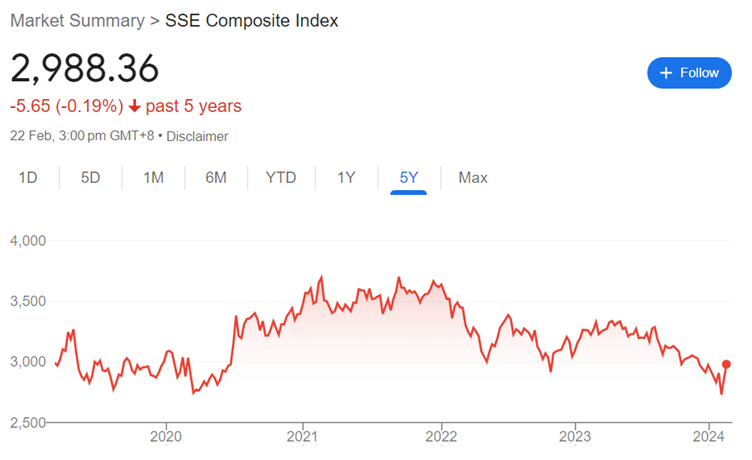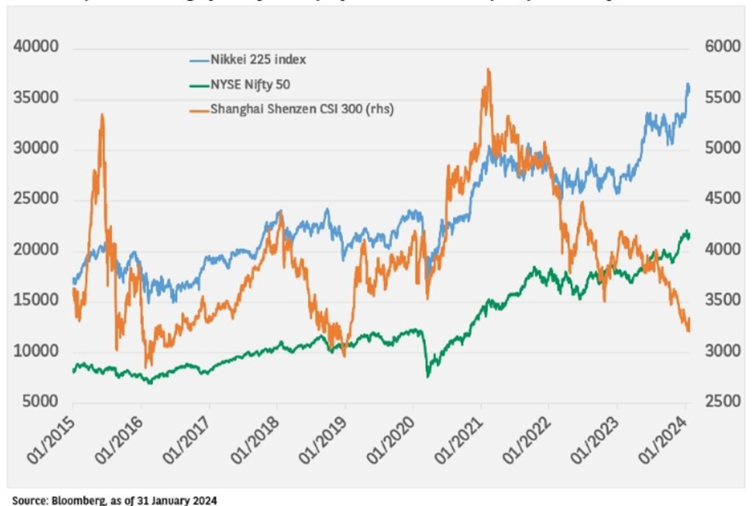
Chinese Stock Market in Trouble: Sensex at 1,00,000 soon?
The Chinese stock market is not in good shape, and which country is likely to benefit the most from the downfall of China's market? No point in guessing - it is the Indian equity market. In this article, we try to ascertain the issues around China's stock market, what the government is trying to do to make things right, and finally, evaluate if they will succeed? If they don't, the Indian market will most probably benefit, so stay till the end to find the answer.
The problem in China
Foreign investors are dumping Chinese stocks. In December, China's CSI 300 index saw its longest weekly losing streak since 2012 - the worst time for investors in more than a decade - it is worth calling out.
Let us look at Shanghai Composite Index returns to get a better idea of the overall market's health. In the last five years, the index has given flat returns - close to zero. In the last one year, the index has been down by 9%, but in the last month or so, it has been up by 10%. The long-term flat returns suggest that the economy and companies are performing poorly, and the short-term gain suggests that the market is getting the push - it is coming from the government - we look into it later.

In this section, let us focus on the issues with China - why are stocks not performing? The list is long: the real estate crisis, high youth unemployment, and weak consumer spending. Another big problem is deflation in China. Let us look at that in detail. Deflation is a sustained decrease in the general price level of goods and services within an economy. It occurs when the supply of goods and services outpaces demand, leading to reduced consumer spending, lower investment, and ultimately, economic contraction. The sector that has been most affected by deflation is real estate - it saw the worst fall in price since 2015.
Now, coming to the stock market, the stocks are not performing because, fundamentally, the economy is not in the best condition. The net upgrade ratio and the percentage change in consensus earnings-per-share forecasts are both poor. Price-earnings ratios have dropped on average to 10.4 times current earnings, far below the 12.5 times averaged over the last ten years.
The growth rate has slowed significantly from historical averages, and earnings growth, which is considered the fundamental support for stock values, has slowed with it.
In such a landscape, it is no wonder that Chinese stocks have performed poorly.
The Government Intervention
The Chinese government has realized that it needs to do something to attract investors because the Indian markets are doing well. If they don't, all the money from institutional investors will flow to India.
But the problem is that unless the market performs, no investor will be attracted. If you compare the returns of the Indian and Chinese markets, you will see a significant difference in returns.

Now, the Chinese government has to come to the rescue—stock market rescue.
- First, the government is asking government-backed companies to invest in the market. It is like the Indian government asking LIC to invest in Indian companies so that market sentiments improve. As per reports, these government-backed companies have pumped in nearly $10 billion in Chinese stocks in a month or so.
- Earlier in the month, as per the CSRC report, the government put curbs on short-selling. It includes stopping brokerages from expanding lending for short-selling stocks. The government is closely monitoring the short-selling situation. They have released information on cases it uncovered on short-selling to stop such moves. For example, they made information public about how one group selling $380 million in stock via more than 100 brokerage accounts earned 130 million yuan in illicit profits.
- Third, they are asking Chinese investors to withdraw money from the international market, bring it back to the country, and invest in Chinese stocks. Now, the vital question is - will it change market sentiments?
Will it change market sentiments?
So, this is not the first time the Chinese government has come to the rescue of the stock market. In 2015, they did the same and intervened through various measures. They did mostly the same thing - directly intervened by purchasing stocks, particularly through state-owned entities such as the China Securities Finance Corporation (CSF). These purchases aimed to provide liquidity and support stock prices.
Authorities temporarily halted trading on certain stocks and indices to prevent further panic selling and give markets time to stabilize. Finally, the government encouraged state-owned enterprises, pension funds, and other institutional investors to purchase stocks to stabilize prices.
What was the outcome back then? In 2015, it did help change market sentiments. But will it happen again? On paper, the move should change sentiments because when a retail investor sees that the government is buying in volumes, why should they stay behind - the rally will surely come. So, in the short term, the market has performed well - we have already mentioned this at the start.
But in the mid-term, will it have a significant impact? Most experts believe - NO. The situation from 2015 is different now. Back then, the Chinese economy was in good shape, but the market crashed because of the bubble. And after every bubble bursts, the rally comes, eventually. The situation this time around is different. This time, the economy is in bad shape - pretty bad shape - we have covered all the reasons in the previous section.
Investors know that in the short term, prices are not increasing because of higher earnings or strong fundamentals but because of artificial pumping by state-owned companies. So, investors will be cautious because, at some point, the companies will have to withdraw the money, and if fundamentals don't improve by then, the market can crash down to even lower lows.
Before you go: India to benefit from the Chinese market crash?
Big research firms and investment houses have been writing positive news about India. India is already in an excellent space - most believe India is a long-term growth story. For this reason, it remains an attractive destination for investors with long-term views.
Given the push by the government, China should be able to change sentiments - since most stocks are available at cheap valuations. But it won't be easy for the reasons we have covered.
If China is unable to attract foreign investors, India will benefit even more, as even the money that was supposed to go to China may come to India. And if Indian companies continue to report strong growth numbers, who knows, the magical figure of SENSEX at 1,00,000 will become a reality, much sooner than most expect.










